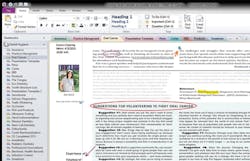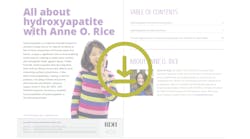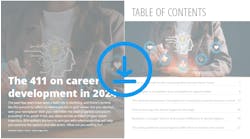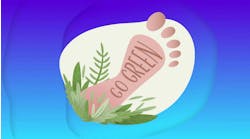I urge recent graduates and even those further into your careers to manage and collate your dental hygiene knowledge. As a recent grad, I remember finding myself being swamped with articles, handouts, product literature, and monthly issues of professional magazines.
The importance of knowledge management presented itself to me when I began to notice the difficulty in accessing specific information from the ever-growing stacks overflowing my workspace. I knew the answers were within these stacks, but I often spent more time searching for three lines of highlighted material instead of productively finding an answer -- both frustrating and fruitless time management.
I soon realized a system of organization was needed to provide a concise and easily accessible database from which to reference. Not all knowledge can be stored -- tacit knowledge which you acquire while on the job cannot be archived and referenced through media -- but the articles and publications which you procure during these early years will allow you to build an expansive body of knowledge from which to cite. Many key concepts within the dental profession rely upon a comprehensive knowledge of prior technologies and a keen sense of cyclical trends.
Managing your knowledge for your dental hygiene career:
- Informs and supports future decisions
- Eliminates the possibility of repitition, allows for more efficient time management, and higher returns on time invested
- Organizes pertinent data that forms a personal encyclopedia
- Provides accessible information that can be utilized for resume and portfolio building
- Demonstrates progression and growth in both the individual's learning and also in the dental industry
- Facilitates the transition from a new graduate to a working professional
There are different ways to go about developing an organized framework for reference. Dropbox, Google Drive and Microsoft OneNote are a few digital systems that I find valuable for professional use. Yet, I will always maintain a soft spot for the physical collection of RDH magazines that adorn the shelves near where I write. I find comfort in the paper and highlighting of articles and Post-it filled pages. Looking back now, I reflect on the attempts to manage my knowledge before going paperless. My first attempt was an "ah-ha" notebook. I would just jot everything down that I didn't want to forget in my little notebook. Well, the little notebook was not easy to navigate, and my handwriting was so atrocious it was barely legible.
The next evolution came in bound form, a binder with tabs and a table of contents that divided various dental subjects. Anything collected would be filed into the appropriate section. This binder was an astute method for document control, and I was proud of it. But it did not suffice since it was not easily referenced after years of collecting.
Conveniently, electronic versions of RDH magazine are available which allows me to take my data management to a practical and contemporary level. My secret is Microsoft OneNote. This is the best program I have found to manage my dental hygiene learning.
Figure 1 displays a screenshot of my virtual notebook. On the left are the subjects of my notebook; they are also displayed as tabs horizontally across the screen. The Oral Cancer Tab is selected in this illustration. When you select your subject tab, then you are able to see "pages" in that section. The current page selected is of an article from the October 2012 issue of RDH. OneNote allows me to easily insert a screen clipping from the electronic version of the article that I can highlight, note, and tag in the way I want. Tagging is a great feature as it facilitates easy accessing and search-ability of this database. Text can be highlighted within the article and you can create tags such as "website to visit" or "book to read."
I find the tagging feature especially helpful while taking notes at a seminar. The speaker often ad libs his favorite quotes, books, people, or other miscellaneous material and I am able to tag it for easy finding later. This allows me to obtain a deeper knowledge of the subject matter while permitting me to research in my own time.
Taking seminar notes in OneNote is very user friendly. Photos and videos can be inserted, and you can add voice notes or record the audio of the seminar you are attending. The search box in the upper right corner is what makes your information accessible, buildable, and practical. As I start to type in the word "biofilm" all various matches begin to populate from my entire notebook. Or I can search my entire notebook for tags like "products to try," "article Ideas," and "oral cancer statistics." The notebook automatically saves to a cloud database. You have universal access to your notebook, and can even open it on your smartphone or a computer that doesn't have the program downloaded. I am at ease knowing that any seminar I attend, or advertisement or research I that I read, can be filed and referenced later.
OneNote replaces all the sticky notes, doodles and paper that overwhelmed my dental hygiene life. Not many things are collected physically anymore. However, you choose to manage your knowledge, bear in mind its potential significance in your future endeavors. Winston Churchill said, "The empires of the future are the empires of the mind." Managing and organizing your collected knowledge over the coming years will prove invaluable to you.
Two helpful OneNote videos are available at: http://office.microsoft.com/en-us/support/getting-started-with-of fice-2010-FX101822272.aspx#6 or http://www.youtube.com/watch?v=f6btloHIvpw. RDH
TRISH DE DIOS, RDH graduated as president of her dental hygiene class in 2008. She currently works full-time clinically and is also a Regional Coordinator for The Oral Cancer Foundation. She can be contacted at [email protected].
Past RDH Issues








